

The Prophet Muhammad ﷺ was born in 570 A.D., in the land of Arabia. Much of Arabia is desert-vast, silent, barren regions where the stars loom large at night and where people depend for their survival upon shade, water and each other’s goodwill. There were three major towns: Yathrib, a large oasis now called Madinah; Taif, a cool refuge in the mountains famous for its grapes; and Makkah which, by contrast, lay in a barren valley. It was in Makkah that the Prophet ﷺ first saw the light of day.
Now Makkah is famous as the birthplace of the Prophet Muhammad and the focal point of the Hajj pilgrimage, but in those days it was important because it was at the junction of many trading routes. It was even more important as the home of the Kabah, where people came from far and wide to worship. The original Kabah was built by the Prophets Ibrahim and Ismail (Abraham and Ishmael), whose lives were particularly devoted to Allah.
The Prophet Muhammad’s father, Abdullah, died two months before his birth, and his mother, Aminah, was naturally very sad. But still, she felt strong and well as she waited for her baby to be born. When he came into the world, Aminah sent word to her father-in-law, Abd al-Muttalib, who was sitting near the Kabah as he always did.
Abd al-Muttalib was the head of the Quraysh tribe, guardian of the Kabah and protector of the pilgrims who visited this holy place. He was respected and admired by all. But he was not like the other Arabs who had drifted away from the teachings of the Prophet Ibrahim and had begun again to worship idols. He was one of the hanifs, or pious people, who believed in Allah, the one true God, with all his heart. He was happy to hear the news of the birth and began to think of a name for the baby boy. Finally he decided upon Muhammad, an unusual name that means “often praised,” or “worthy of praise.”
For some time before his birth, believers had prayed for a prophet to come, and there had been signs that Allah had heard their prayers. Jewish scriptures told of a prophet that was to come. On the night of the Prophet’s birth a learned Jew in Yathrib saw a brilliant star he had never seen before. He called people together around him and, pointing to the star, told them that a prophet must have been born. Word spread quickly.
The original Kabah was built by the Prophets Ibrahim and Ismail, whose lives were entirely devoted to Allah. But over the centuries people began to drift away from the One God and set up idols there to many other gods. In the days of the Prophet Muhammad, the Kabah was surrounded by 360 altars, statues and cult objects of these various deities. The most important tribe living in and around Makkah was the Quraysh. They were merchants who had control of both the Kabah and Makkah’s water supply. They profited greatly from giving protection and catering to the needs of the vast numbers of traders who came from far and wide to buy and sell, and the thousands of pilgrims from many different countries. It was into this tribe that the Prophet Muhammad was born.
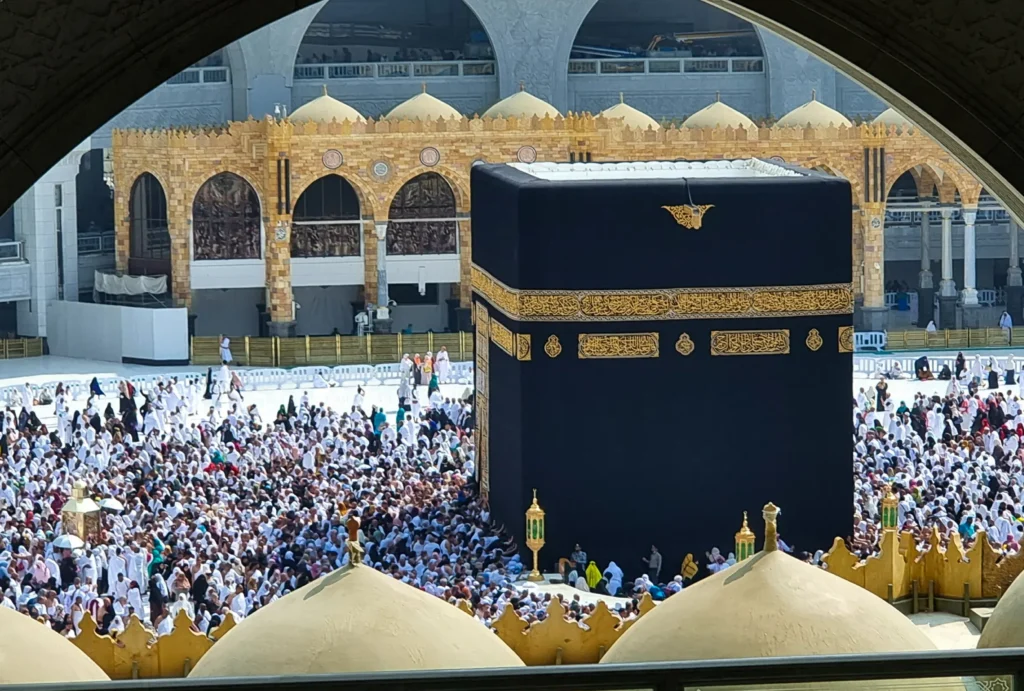
Allah sends prophets into the world to show us how to live. That is why Allah sent the Prophet Muhammad into the world also. But He did not want him to live like a hermit, to give up the world and go and live by himself in a mountain cave, or in a forest. Granted, it is much easier to lead a pure life and to think about the Almighty when you are not troubled by worldly matters and you are away from people and temptations. But because Allah wanted the Prophet to be a shining example to humanity, He destined him to live amongst other human beings, like any other ordinary man to have a family, to work for his living and to have his share of troubles, joys and sorrows

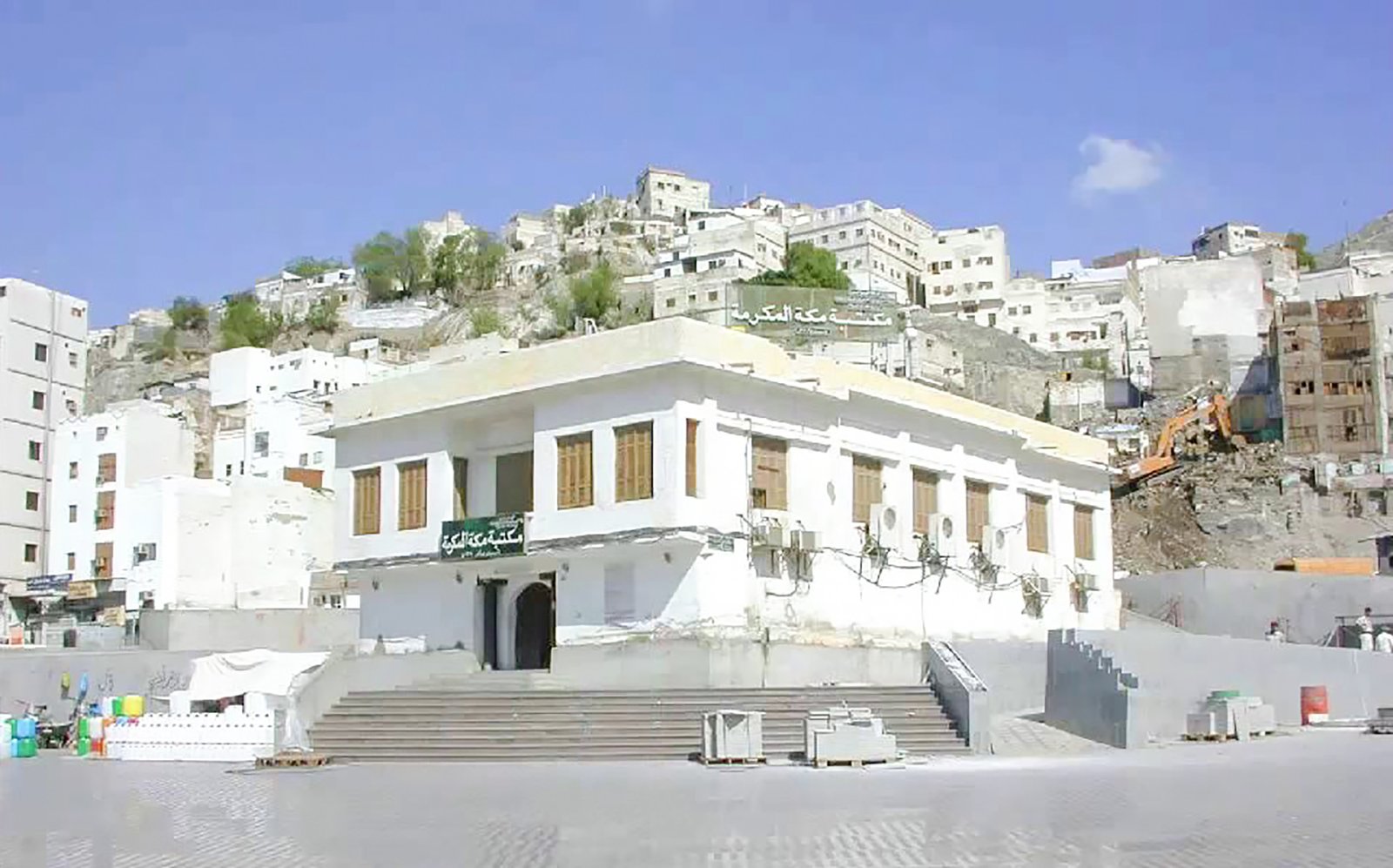
In those times, it was a well-established custom among the people of Makkah for mothers to send their newborn babies into the open desert to be cared for and nursed by foster mothers. These foster mothers were typically women from the Bedouin tribes, who lived a simple and rugged life, tending to sheep and cattle in the vast and arid landscapes outside the city. The people of Makkah believed that the harsh yet pure environment of the desert was far healthier than the bustling city, allowing children to grow strong, develop resilience, and learn the eloquence of the Arabic language from the Bedouins, who were known for their purity of speech and refined dialect. Aminah, too, did this, and so the little Muhammad spent the first years of his life with a woman named Halimah and her family of the Banu Sa’d tribe. Halimah worried that she would not be able to care properly for the baby Muhammad. They were very poor, and because of the previous year’s famine, she had hardly enough milk to feed her own baby.
As soon as Halimah began nursing baby Muhammad, her milk, which had been insufficient for even her own child, suddenly increased. This was just the beginning of many blessings. When they returned home, their once dry and barren land became green, and the date palms, a vital source of food, became heavy with fruit. Their livestock, which had been weak and malnourished, regained their strength and began producing more milk. The family, who had been struggling, now found themselves in ease. Halimah and her husband firmly believed these blessings were due to the presence of baby Muhammad ﷺ.
During his stay, Muhammad ﷺ grew into a strong and healthy child. He played with Halimah’s children and accompanied them as they took the sheep to graze. His time in the desert strengthened him both physically and in character, making him resilient and observant. When he returned to his mother, Aminah, he was no longer a fragile infant but a strong and healthy three-year-old, ready for the next stage of his life.
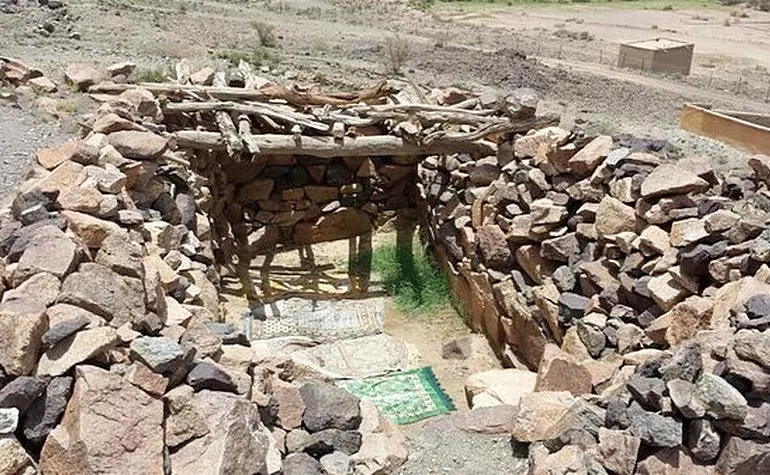
The Prophet Muhammad ﷺ revered parents. He would say:
"Paradise lies at the feet of mothers",
"God's pleasure is in the father's pleasure & God's displeasure is in the father's displeasure."
Those, he believed, who served their parents well, were deserving of Paradise.
A man once asked the Prophet Muhammad ﷺ:
"Who rightfully deserves the best treatment from me?"
"Your mother," said the Prophet ﷺ.
Then the man said, "Who comes next?"
"Your mother," said the Prophet ﷺ.
"Who is after that?" asked the man,
"Your mother," was the Prophet's answer.
"Who comes next?" insisted the man again.
"Your father," said the noble Prophet ﷺ.
Prophet Muhammad ﷺ gave great importance to family ties.
He said: "The best man is he who is best to his wife."

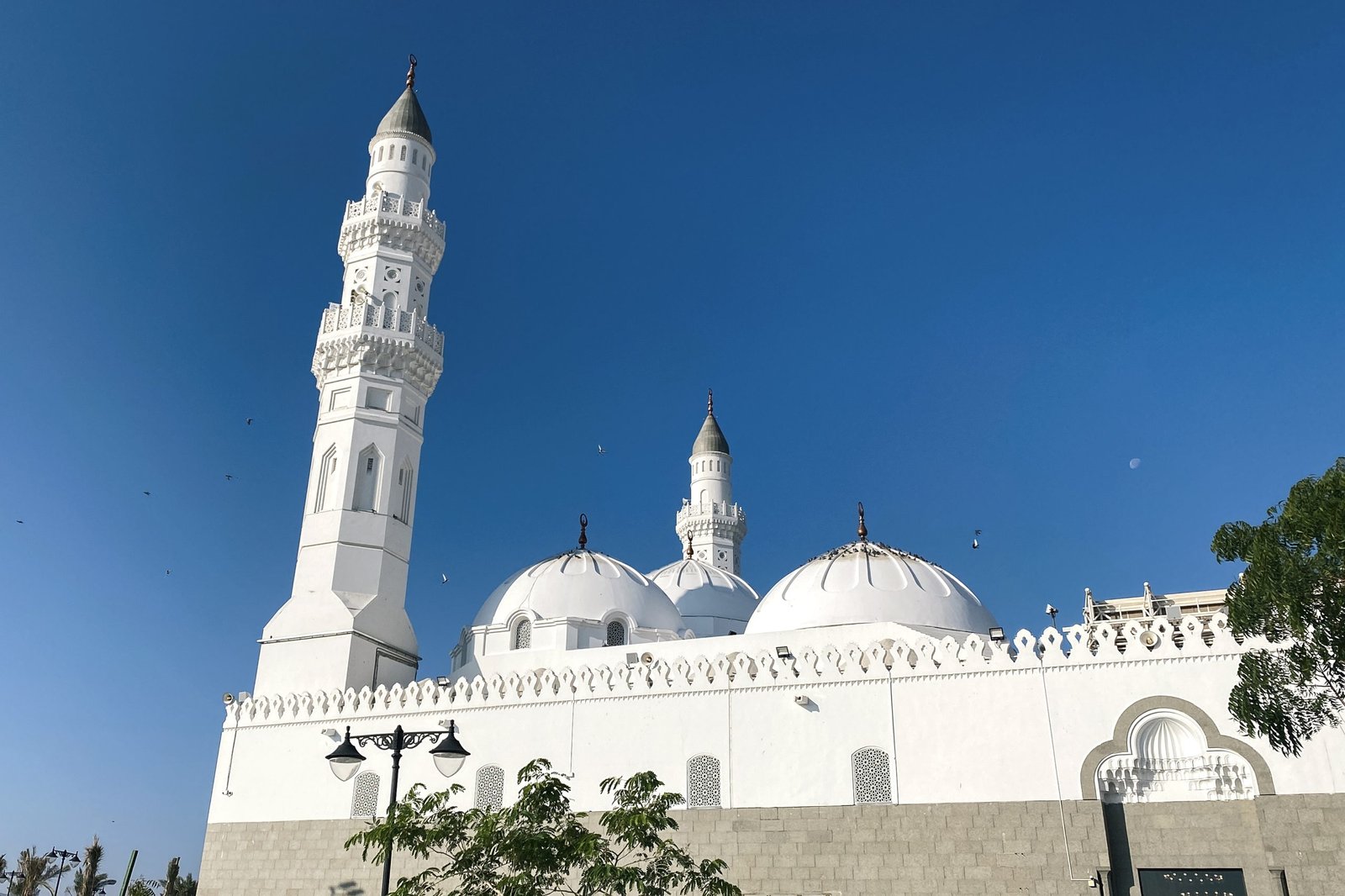
When Muhammad ﷺ was six years old, his mother, Aminah, decided to take him on a journey to visit his uncles in Yathrib, the city now known as Madinah. Nestled among volcanic hills in the Hijaz region of western Arabia, Yathrib was an oasis renowned for its fertile land and abundant date palms. Located about 100 miles (160 km) inland from the Red Sea, it was a significant settlement in the region. Traveling by caravan, young Muhammad ﷺ found joy in the adventure. He met his cousins, played with them, and even learned to swim, embracing the warm hospitality of his extended family. The month spent in Yathrib was a happy time for both mother and son, as they enjoyed the refreshing climate and the company of their relatives. However, on their journey back to Makkah, tragedy struck. Aminah fell gravely ill along the way and, before reaching home, she passed away, leaving young Muhammad ﷺ an orphan.
Little Muhammad ﷺ returned to Makkah under the care of Aminah’s devoted maid, Barakah. Upon his arrival, his grandfather, Abd al-Muttalib, took him in and cared for him with deep love and affection. Abd al-Muttalib, a highly respected leader of the Quraysh, believed that Muhammad ﷺ was destined for greatness and treated him with special care. Muhammad ﷺ would sit by his grandfather’s side near the Ka‘bah, quietly observing as he conducted important discussions and made decisions for the tribe. Even at a young age, he displayed wisdom and patience beyond his years. Two years later, when Abd al-Muttalib fell ill, young Muhammad ﷺ stayed close, attending to him with devotion. After his grandfather’s passing, Muhammad ﷺ was adopted by his uncle, Abu Talib. Despite Abu Talib’s large family and many responsibilities, he welcomed Muhammad ﷺ wholeheartedly, treating him as his own son. Muhammad ﷺ quickly became his uncle’s favorite, receiving his love and protection throughout his youth.
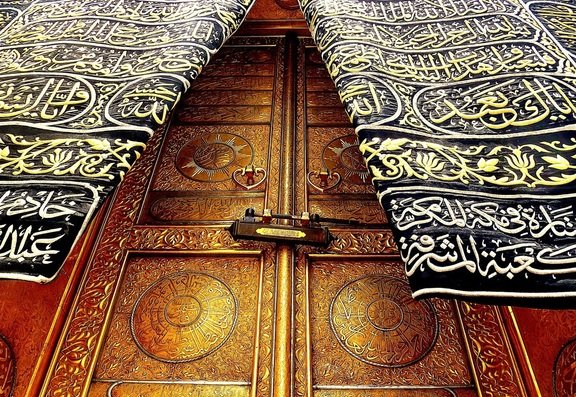

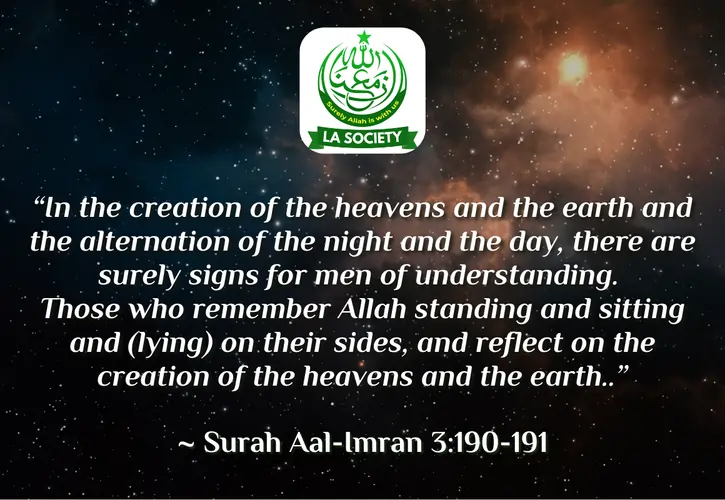
We learn from the stories of his life that Muhammad ﷺ was a very thoughtful boy. He took good care of his family’s sheep, and played with the other children. But he also spent much time alone, wondering about the mysteries of nature. He thought about the people around him, how they lived and how they behaved. Even when he was a very little boy, Halimah said that she often found him sitting by himself. There are stories about how, even as a youngster, Muhammad ﷺ believed in one God, the God of Ibrahim. He never worshipped idols and refused to swear by them as other Arabs had come to do. These stories also tell us that Muhammad ﷺ was troubled by the fact that people always seemed to be struggling for power and money, and that once rich and powerful, they became arrogant and showed no generosity to the poor and needy. We do not know exactly what Muhammad ﷺ looked like, but his cousin, ‘Ali ibn Abi Talib, has given us some idea. Hazrat ‘Ali (RA) said Muhammad ﷺ was of medium height, broad-shouldered, and had curly hair and a thick beard.
His walk conveyed strength and resolution: he walked softly but firmly, with large swift strides, and bent slightly forward. Some say the ground seemed to roll itself up for him, and his disciples had to work hard to keep up with him even when the Prophet ﷺ walked at a leisurely pace. The Prophet ﷺ’s skin was tawny and his eyes shown light brown from under bushy eyebrows. The Prophet ﷺ’s eyes did not wander around, looking at this and that. They were usually downcast. But when he did look up at something he would look straight into it. By the time he was 25 years old, Muhammad ﷺ had a reputation for honesty (he was called “As-Sadiq” ie. The Ruthful one and “Al-Amin” ie. The Trustworthy). He was known among the Quraysh as the bravest and most gentlemanly person. He was a good neighbour, tolerant and always truthful. He always kept aloof from quarrels and quibbles, and never used foul language or abuse. ‘Ali ibn Abi Talib once said, “All who came close to him grew to love him.”
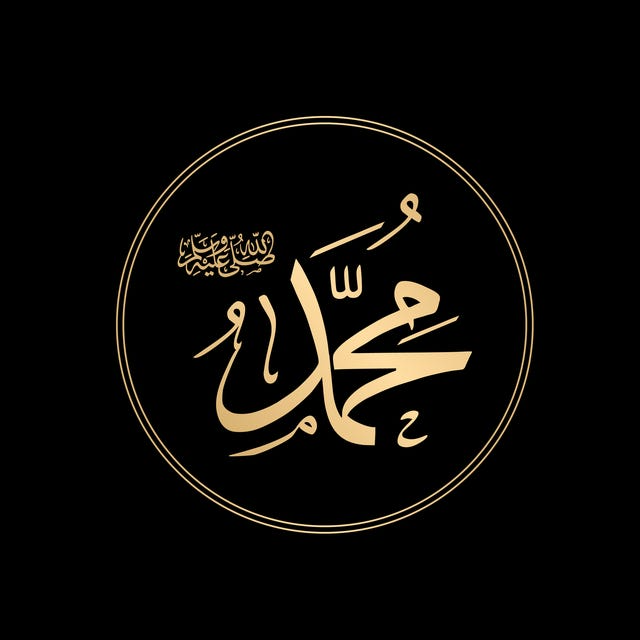

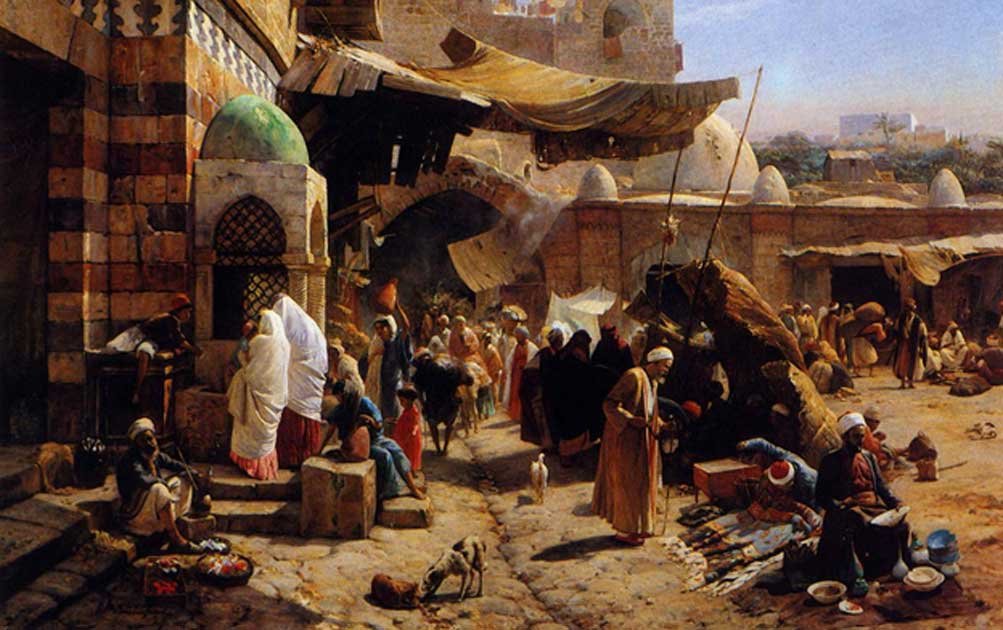
Muhammad ﷺ’s experience of trading, together with his excellent reputation, drew him to the attention of Khadijah RA, a beautiful and wealthy widow belonging to a family of merchants. Khadijah RA employed Muhammad ﷺ to take her goods to trade in Syria. Muhammad ﷺ handled the trading very well, and brought back more profits than Khadijah RA had ever made before. Also, Khadijah RA’s servant, Maysarah, who accompanied Muhammad ﷺ to Syria, had come to admire and respect him greatly, and gave a glowing report to her mistress about what a superior person Muhammad ﷺ was. Muhammad ﷺ’s refined speech and looks had made a profound impression upon Khadijah RA, and she wanted to marry him. When Khadijah conveyed through her friend, Nufaysah, Muhammad ﷺ, having great respect for Khadijah RA, happily said yes. The marriage was a joyful one.
They were well suited to each other, and were blessed with six children, two boys and four girls. Sadly, however, both sons died at an early age. When the Quraysh’s persecution of the Prophet ﷺ was at its height, just before Muhammad ﷺ’s decision to leave Makkah, Khadijah RA died. It was a terrible loss for Muhammad ﷺ. In the years after Khadijah’s death, Muhammad ﷺ married other wives. He had only one more child, by the last of these wives, a son named Ibrahim, who also died in infancy.
Zayd ibn Haritha (also known as adopted son of Muhammad ﷺ) – in his childhoold was once travelling with his father, Haritha, when their caravan was attacked. He was dragged away to a market and sold there as a slave. The person who bought him, Khadijah RA, thought he would be useful to her husband, Muhammad ﷺ. But the Prophet ﷺ did not like the idea of slavery, so when the boy’s father Haritha came to Makkah and begged him to give him back, saying that he would pay whatever he wanted, the Prophet ﷺ told him that he did not want any compensation. If Zayd wanted to go with him, he could take him. Much to Haritha’s surprise, Zayd said that he had been shown so much love by the Prophet ﷺ that he preferred to stay with him. The Prophet Muhammad ﷺ then took Zayd to the Kabah, and in the presence of Zayd’s father and uncle, announced to everyone that this boy was now his son. Haritha and his brother went away happily, knowing that Zayd was in good hands.
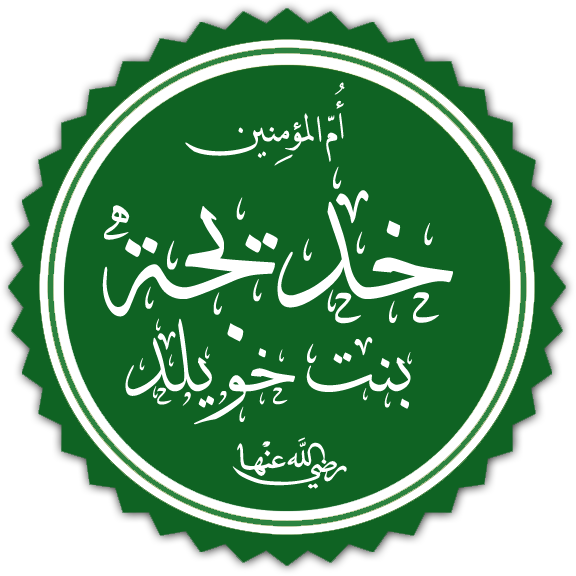
The Prophet Muhammad ﷺ once remarked with great wisdom that you should always tell the truth, because that leads to a life of virtue, and that you should stay away from people who tell lies, because that leads to a life of evil.
Indeed, the noblest quality in a man or woman is honesty. It shines forth, showing purity of soul. One who tells lies mars his inner self and sinks deeper and deeper into evil.
The Prophet ﷺ taught us that:
"It is obligatory for you to tell the truth, for truth leads to virtue and virtue leads to Paradise, and the man who continues to speak the truth and endeavours to tell the truth is eventually recorded as truthful with Allah, and beware of telling of a lie for telling of a lie leads to obscenity and obscenity leads to Hell-Fire, and the person who keeps telling lies and endeavours to tell a lie is recorded as a liar with Allah."
(Sahih Muslim 2607c)

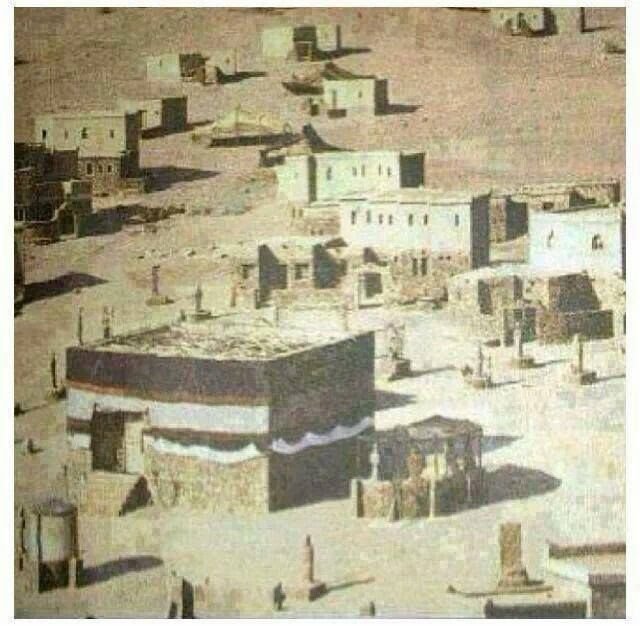
Even as a boy, Muhammad ﷺ was concerned about his fellow men. One day a trader from Yemen had his goods stolen by a group of wicked Makkans. The trader called out for help, but no one came forth. So the trader wrote a poem that made fun of the Makkans’ bad behaviour, and recited it out loud in public for all to hear. When Zubayr, one of Muhammad ﷺ’s uncles, heard this poem, he felt ashamed. Zubayr called the city elders to a meeting, and an organisation was formed to protect the oppressed people of Makkah. This included foreign visitors as well as the people who had always lived there. Muhammad ﷺ became an enthusiastic member of the group, called Hilf al-Fudul, who pledged themselves to be courteous and considerate towards others, especially those weaker than themselves.
Many years later, Muhammad ﷺ still kept this promise to Hilf al-Fudul, saying: “I am not prepared to break my promise, even against a herd of camels; if somebody should appeal to me even today, by virtue of that pledge, I would hurry to his help.” The Prophet Muhammad ﷺ’s sense of justice, his prompt understanding of problems and his real interest in his fellow men combined to make him a leader. He could always be relied upon to judge fairly and was more and more sought out to help settle disputes. His fame got a mighty boost by an incident that took place when Muhammad ﷺ was not more than 35 years old.
The Kabah caught fire and burned to the ground. All the tribes of Makkah took part in repairing it and building it up again, but when it was time to put back the sacred Black Stone first laid by the Prophet Ibraham AS, there was a crisis. Each of the four leading families of Makkah claimed that they alone should have that honour. Finally, it was agreed that the first man to enter the courtyard of the Kabah would settle the issue. That man was Muhammad ﷺ.
It seemed like a problem which could not be solved, but Muhammad ﷺ had a simple idea that saved the honour of everyone concerned. He spread out a white sheet on the ground and placed the sacred stone at its center. Then he instructed the elders of each clan to lift a corner of the sheet and carry the stone to its site. Then Muhammad ﷺ, the peacemaker, fixed the stone in its place with his own hands.
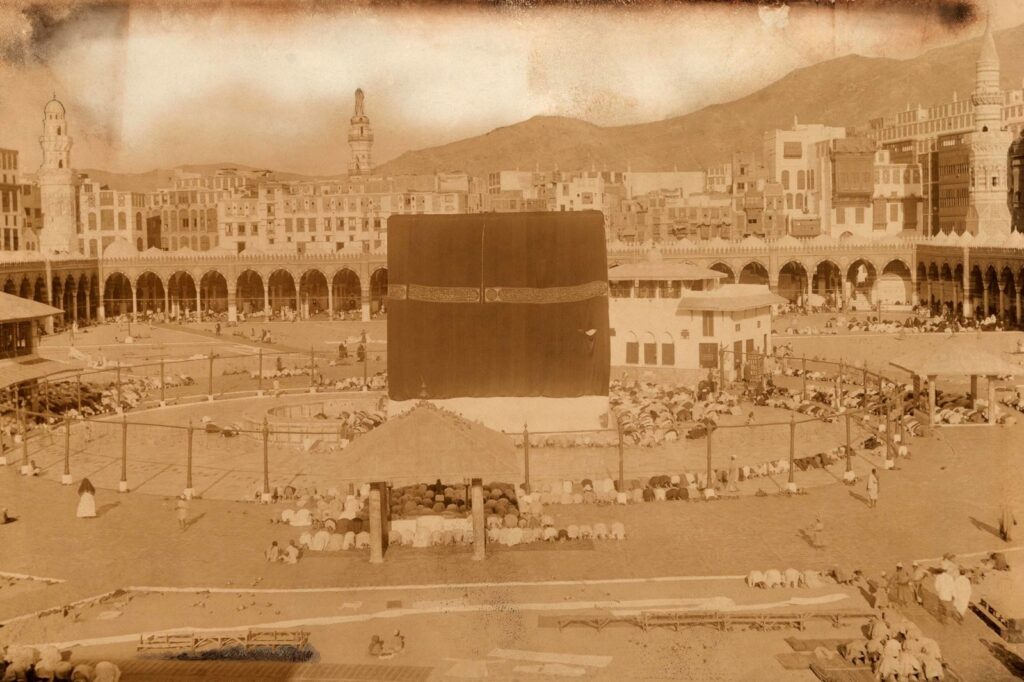
There was an old Makkan who hated the Prophet ﷺ.
Every morning when he passed by her house, she would empty a basket of rubbish on his head from the upper story of her house. He never grumbled or said anything to her.
One day she was ill and in bed when he passed that way. Surprised that no rubbish had been emptied on his head, he thought,
"She must be ill," and went upstairs to enquire how she was.
The woman was very frightened. She thought he had come to quarrel with her.
When he said he had come to enquire after her health, she began to cry.
"What a good man you are," she sobbed.
"I ill-treated you and your enquire after my health. Teach me your religion. Teach me your way of life."

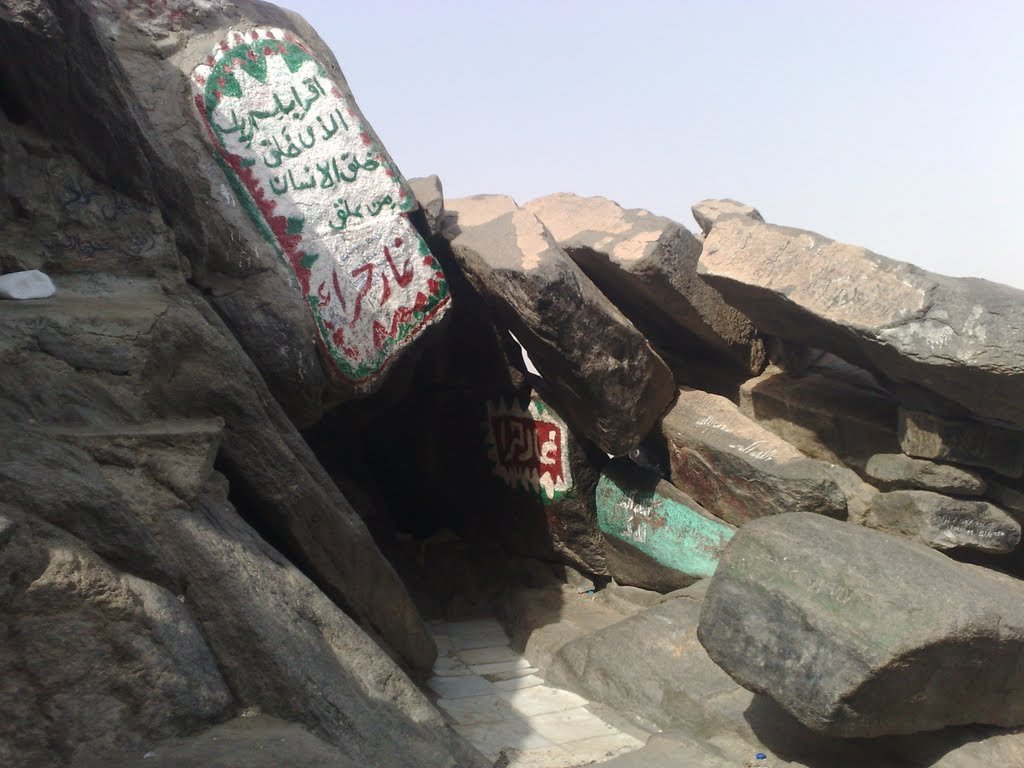
The Prophet Muhammad ﷺ’s marriage with Khadijah gave him every opportunity to lead a comfortable life as a wealthy and respected noble of Makkah. And, indeed, for a few years Muhammad did lead a calm and quiet life as a merchant. But he soon gave up all worldly activity and set himself to searching for the truth.
Instead of meeting people all the time in their homes and at gatherings, and trying to gain for himself a position among the nobles of Makkah, Muhammad ﷺ would wander into the barren hills of the desert. He would sit for hours and ponder the mysteries of creation. The vast silence of the desert, with endless sand and sky and, at night, equally endless darkness, alive only with the twinkling of millions and millions of tiny stars, seemed to bring one very close to the Creator. Often Muhammad ﷺ would stay alone for days in the Cave of Hira, which was near the top of Jabal al-Nur, or the Mountain of Light, three miles from Makkah.
He would return home only for more supplies of food and water, and then go back to the solitude of nature to pray and meditate, asking the Maker of the heavens and the earth for answers to the questions that surged in his mind. What is man’s true role in life? What does the Lord require of us, as His servants? From where does man come, and where will he go after death? On the twelfth of February, 610 A.D., Muhammad ﷺ, now forty years of age, went to the Cave of Hira to spend Ramadan, the traditional month of retreat. He was sitting all alone in this cave, when he had an extraordinary experience.
Here are some of the laws which the Prophet Muhammad ﷺ taught his followers:
1. Control your anger, then forgive your brother. Do you not wish to be forgiven? Source
2. Do not hate each other, envy each other or provoke each other. Source
3. Do not spy on each other, or betray each other's trust. Source
4. Do not speak ill of your friend behind his back. Source
5. Give the labourer his wages before his sweat dries. Source
6. Do not drink alcohol, and do not gamble - it opens the door to the devil. Source
7. Do not steal the property of another. Source
8. Do not cheat each other. Source
9. Do not charge interest on money loaned to those who need it.
10. Do not take part in corrupt practices or do anything of which you would be ashamed if it became known.
11. Do not reveal your friends' weaknesses. Cover up their failings if you wish God to cover up yours.
12. Do not pay bribes to get what is not lawfully yours.
13. Do not be cruel to animals.
14. Gladden the heart of the afflicted, feed the hungry, give comfort to the sorrowful and remove the wrongs of the injured.

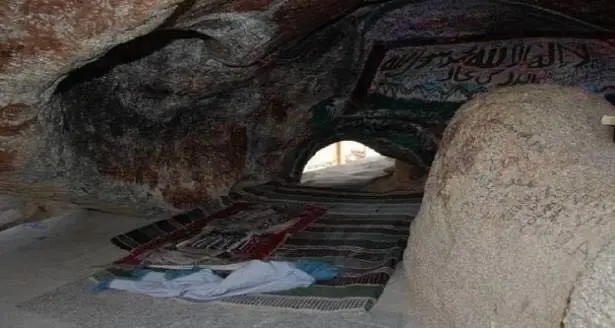
Suddenly, after many days of meditation, the Archangel Jibril The Angel who delivered revelation to the prophets. Click on the link for detailed info. appeared before Muhammad ﷺ in human form. “Read!” commanded the angel. “I cannot read,” Muhammad ﷺ protested. So the angel held Muhammad ﷺ tightly by the shoulders, shook him, and taught him these words:
Read: In the name of your Lord who created, created man from a clot. Read: And your Lord is the Most Generous Who taught by the pen, Taught man what he did not know.
These were the first words of the Holy Quran.
Muhammad ﷺ felt these lines actually written on his heart. But the experience left him surprised and confused. He even felt he might be falling ill. He rushed back to his wife, Khadijah, who comforted him. She took him to her cousin, Waraqah, who told him that the revelation he had had was from the same source as the messages of the Prophets Musa AS and Isa AS Gradually he began to understand-his quest had finally been rewarded. His restless, searching soul had been joined with his Lord. Allah not only gave him guidance, but He also chose Muhammad ﷺ as His Prophet and special Messenger, to bring His word to a world that had gone badly astray. It was a tremendous responsibility. But Muhammad ﷺ, far from becoming vain or proud, remained as good and humble a man as ever. He continued to receive divine revelations from time to time over the next twenty three years, when the Archangel Jibril would come to him in different forms, sometimes huge and filling the horizon, and sometimes just a pair of eyes watching him. Sometimes he remained invisible. Occasionally only his voice could be heard. Sometimes the voice was muffled, like a ringing in his head. But the meaning was always clear. Muhammad ﷺ could neither make the revelations happen, nor stop them. They might happen while he was making a speech, while sitting, while praying, or even while riding his camel.
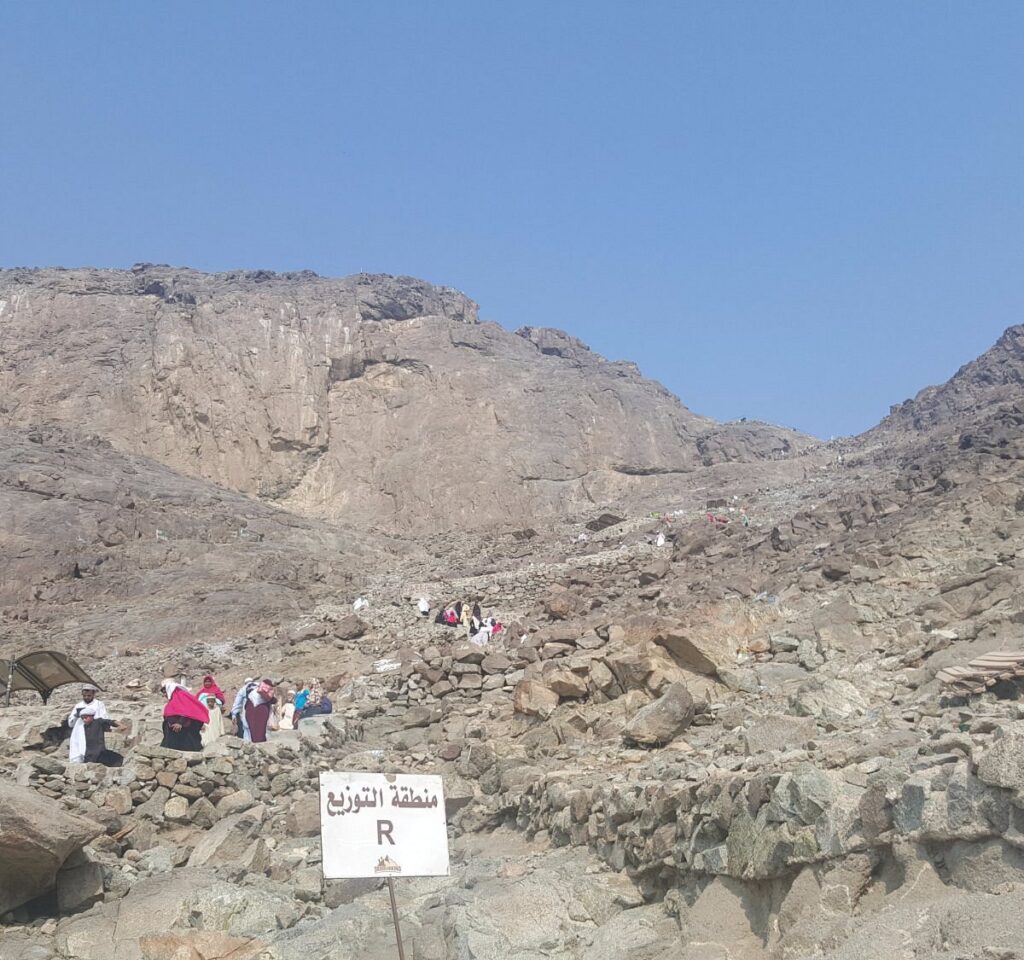
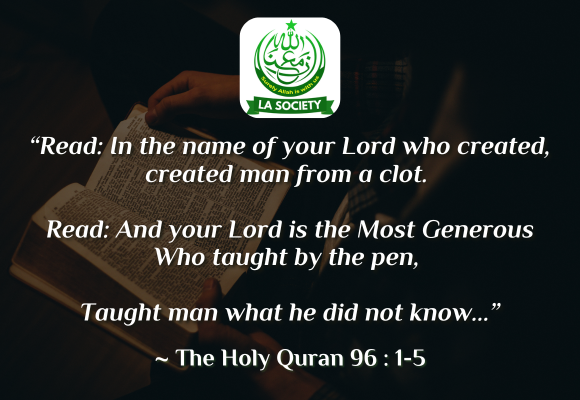
He would fall silent, and normally lay down covered in his cloak. His face might become red and he would perspire profusely, even on cold days. His companions said if you were near am, you could hear something like humming around his face. The experience of the revelations always seemed to make the Prophet Muhammad ﷺ feel close to death, as if he was leaving his body and might never return.
At the end of the experience Muhammad ﷺ would return to normal, and recite the new verses of the Quran. His Companions were instructed to record them.
The Prophet Muhammad ﷺ faced many people in his lifetime who did not believe in him. They challenged him to work a miracle like the Prophet Isa AS in order to prove that God had really sent him as His messenger. This he did not do. He retorted that it was quite unnecessary, as the Quran itself was the supreme miracle.
If anyone doubted it, let them try to compose ten surahs that would bear comparison with it:
"Produce ten invented chapters like it. Call on whom you will among your idols, if what you say be true." (The Holy Quran 11:12)
He also pointed out that there were obvious signs of God everywhere-in the beauty of nature, in life- giving water, in the growth of crops and in the miracle of birth. The entire universe, in fact, was proof of His existence as the Creator and Sustainer.
Allah's message to His prophets was made directly through the angel Jibril. The Quran is the final revelation, made to the Prophet Muhammad ﷺ. There were two main ways in which the revelations came to him. Sometimes the angel Jibril would reveal the verses of the Quran as one man to another.
This way it was easy. But, at other times, it was like the ringing of a bell piercing his heart and tearing him apart. This method was very hard and painful. The revelation of the Quran started when the Prophet ﷺ was 40 years old and continued in parts throughout his life. The last revelation of the Quran came only a few months before his death, when the Prophet ﷺ was 63 years of age.

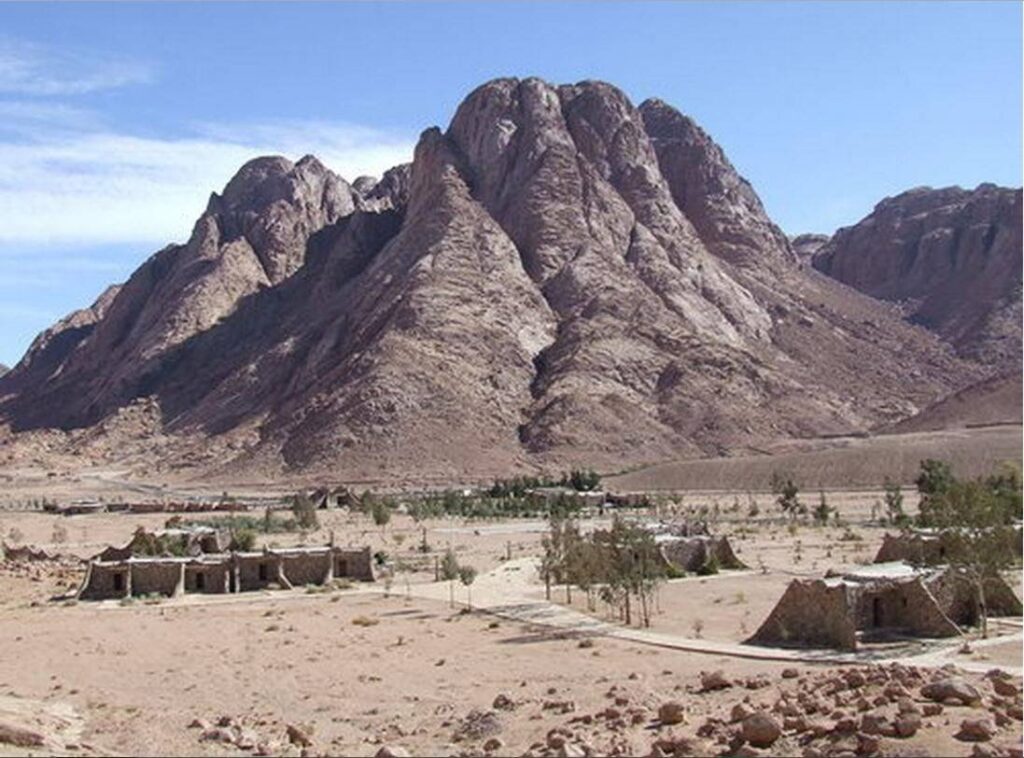
These astonishing events were at first difficult for people to understand. They were still living in an age which is now called the “Days of Ignorance.” And remember that after the first revelation, the Prophet Muhammad ﷺ himself had been totally shaken by the experience. It had only been very gradually, with Khadijah RA’s help, that he had come to understand and accept what had happened- that he had been chosen by Allah as His messenger to mankind. Like Khadijah RA, the Prophet ﷺ’s family and friends realized he was an intelligent, kind and down-to-earth person. The revelations he received were not tinged with selfishness, hatred or ill-will. They were a clear guide to righteousness, and an insight into the kingdom of God. Khadijah RA was the first to respond to the call of the Prophet ﷺ. Her cousin, the wise man Waraqah ibn Nawfal, explained to her that just as Jibril had come to Musa earlier on Mount Sinai and told him to guide his people, so too would Muhammad ﷺ be the Prophet of his people.
But Waraqah also warned that not all the people would listen to the Prophet ﷺ, and some would even try to harm him and his followers. Muhammad ﷺ would need great courage and patience, he said. Khadijah understood, and became the strongest help and support to Muhammad ﷺ in the trials that followed. The next to respond to the Prophet ﷺ was his cousin, ‘Ali RA. Zayd, his foster son, was the third. The first convert from outside the family was Abu Bakr RA, a respected merchant who became the Prophet’s closest Companion. At first Muhammad ﷺ taught Khadijah RA and the small group of friends how to pray, and they would pray together. At a certain point, after the Prophet ﷺ had been doing this for three years, the angel Jibril commanded Muhammad ﷺ to speak openly, and he began to hold public meetings. Slowly the message of Allah, the Maker of heaven and earth and all the things in heaven and on earth, began to spread.
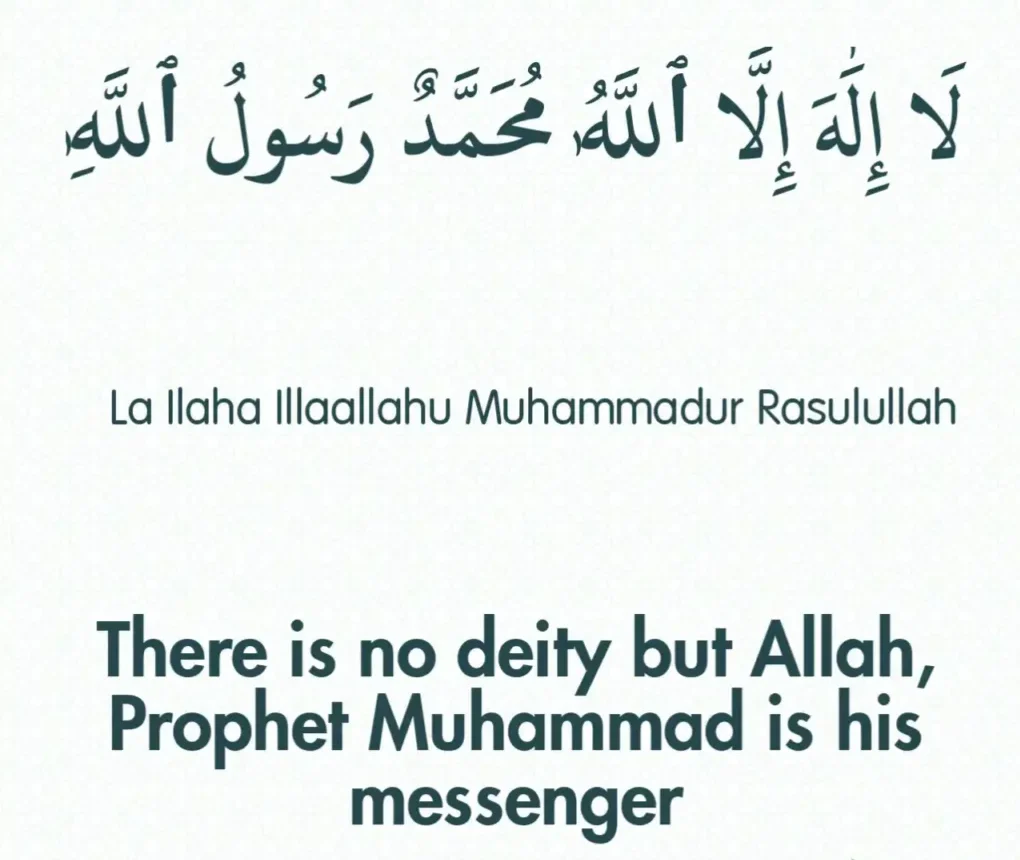
The message the Prophet Muhammad ﷺ brought was not to the liking of many Arabs. He preached that they should worship only one God.
He told them they must show proper respect for women and should not lie, or cheat, or take money which rightfully belonged to the poor and to orphans. Nor should they lend money at a high rate of interest. They must stop drinking and gambling and killing for revenge.
He impressed upon people that there really was a life after death, and there would come a time of judgement when they would be rewarded or punished according to how they had lived. Had they thought only of money-making and their own comfort and luxury? Or had they given freely to orphans, widows, the sick, the hungry and the needy? Had they bowed humbly to God in worship and prayer?
The Prophet Muhammad ﷺ had to convince everyone that, even if they did not believe in life after death, they would be forced to do so once they experienced it. By that time it would be too late to feel sorry and beg forgiveness. The most important quality a person could develop in relation to good and evil was taqwa, that is, being conscious of God at all times and being careful not to overstep the limits set by Him.
True, Allah was merciful and knew all about everyone and their reasons for behaving the way they did-and if people were truly sorry for their bad thoughts and actions, they would be forgiven. But God was also perfectly just-if people who had passed a lifetime doing bad things were still not sorry about them by the time they died, they would not be forgiven.
The Quraysh of Makkah felt particularly threatened. The Prophet's message that there was only one God, and that all men were brothers who served Allah, challenged the way the Quraysh had come to live. They worshipped many different idols, believed in all kinds of magic, fought amongst each other for worldly gain, upheld the code of blood- feud or vengeance, and oppressed and mistreated those who were poorer and weaker than they.
The Prophet's own tribe, the Quraysh, were in charge of the Kabah with its idols, and when they realized that he was trying to stop people from worshipping them, they were furious because they thought their profit was in danger.

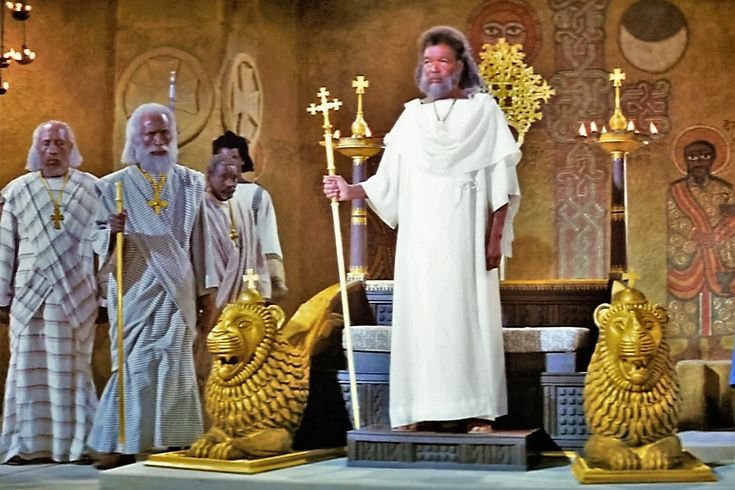
In 615 A.D., five years after the beginning of the revelation of the Quran, a group of the Prophet’s Companions, weary of daily torture and hardship, left Makkah on the Prophet’s advice to seek shelter in Abyssinia (Ethiopia) with the Christian ruler, King Najashi (Negus). Under cover of nightfall 16 of them slipped away, to be followed later by another 83 men and women. When the Makkans discovered this, they were enraged, particularly because the children of many leading families were among them. The Quraysh leaders sent two of their cleverest men to persuade King Najashi to send the Muslims back. On arrival, they first gave gifts to the King’s advisers, saying that some “foolish Makkans” had recently migrated to Abyssinia and that they intended to ask the king for their return. Then they went to the King, and said, “Your Majesty, these people have abandoned the religion of Makkah, but they have not even become Christians like you.”
The King’s advisers promptly urged him to hand them over straight away. But the King, unconvinced, became angry, saying, “No, by God, they came to me for protection and I will hear what they have to say.” The Makkans were dismayed at this realizing that the King would immediately sense the migrants’ sincerity. When the Muslims entered, they did not bow before King Najashi and were thereupon rebuked by the advisers. But the Muslims simply said. “We kneel only to Allah.” Then King Najashi asked them about their religion.
The Muslims’ spokesman, Jafar ibn Abi Talib, ‘Ali RA’s brother and the Prophet’s cousin, said:
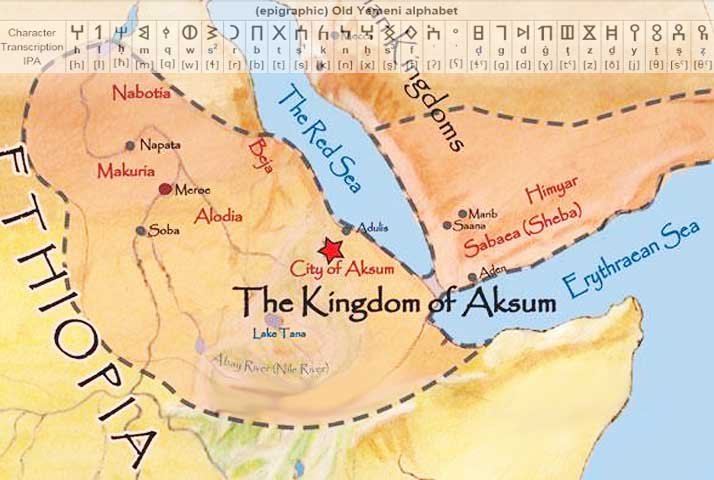
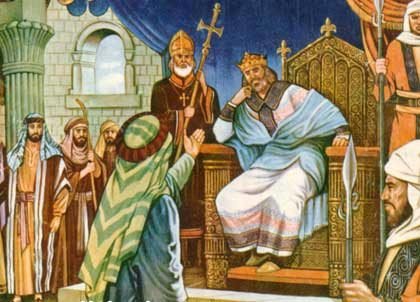
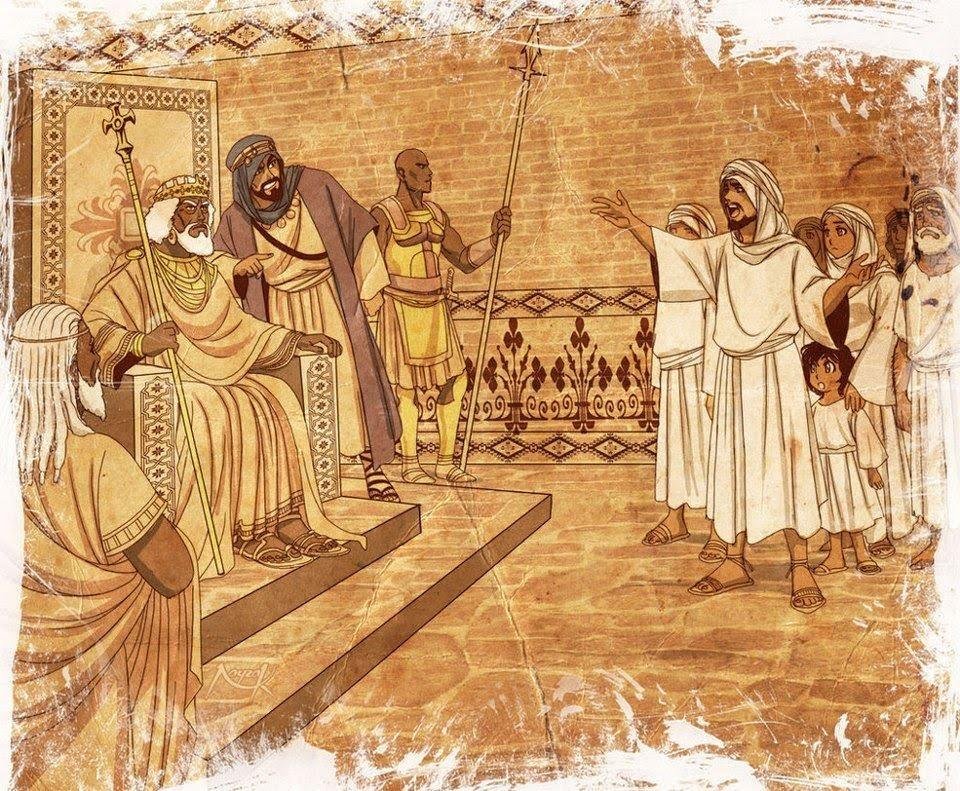
Hearing this, King Najashi said:
“Tell me some of the revelations which your Prophet claims to have received from God.”
Ja’far then recited some Quranic verses in which Maryam, the pure and devoted mother of the Prophet ‘Isa, has to face angry and disbelieving family members. She points to the baby ‘Isa AS, but they say they cannot speak to a mere baby. Then ‘Isa AS himself astonishes them by uttering words of great wisdom. Overwhelmed at this, the King exclaimed: “The messages of ‘Isa and Muhammad come from the same source!” And drawing a line with his cane on the floor, he said joyfully, “Between your religion and ours there is really no more difference than this line.” King Najashi gave the Muslims permission to live peacefully in his realm. The clever Makkans were sent home bitterly disappointed.
“
Isa AS, one of the great prophets, is frequently mentioned in the Quran.
Surah 19, which is named after Maryam AS (Mary), the mother of the Prophet 'Isa AS, tells in graphic detail of the miraculous birth of the Prophet 'Isa, and concludes with the pure words of the Prophet 'Isa, which he spoke while he was an infant in the cradle:
I am Allah's servant;
He has given me the Book, and made me a Prophet.
He has made me Blessed, wherever I may be; and He has commanded me to pray, and to give alms, so long as I live, and likewise to cherish my mother;
He has not made me arrogant or wicked.
I was blessed the day I was born, and peace be upon me, the day I die, and the day I am raised up alive!
~The Holy Quran, 19 : 30-32

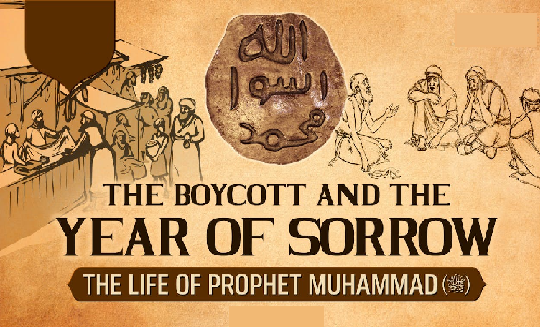
The Quraysh imposed a three-year social ban on Prophet Muhammad’s family in Makkah, isolating them from trade and communication, causing immense hardship. During this time, his devoted wife Khadijah RA passed away. Soon after, his protective uncle Abu Talib RA also died, leaving him vulnerable to his enemies. Seeking support, the Prophet traveled to Ta’if, but its people mocked and attacked him, wounding him severely. Taking refuge in a vineyard, he met Addas, a Christian servant, who recognized his prophethood. Despite his suffering, when offered the chance to punish Ta’if, the Prophet instead prayed for their guidance. In 619 A.D., he returned to Makkah, enduring intensified persecution but remaining steadfast in his mission.

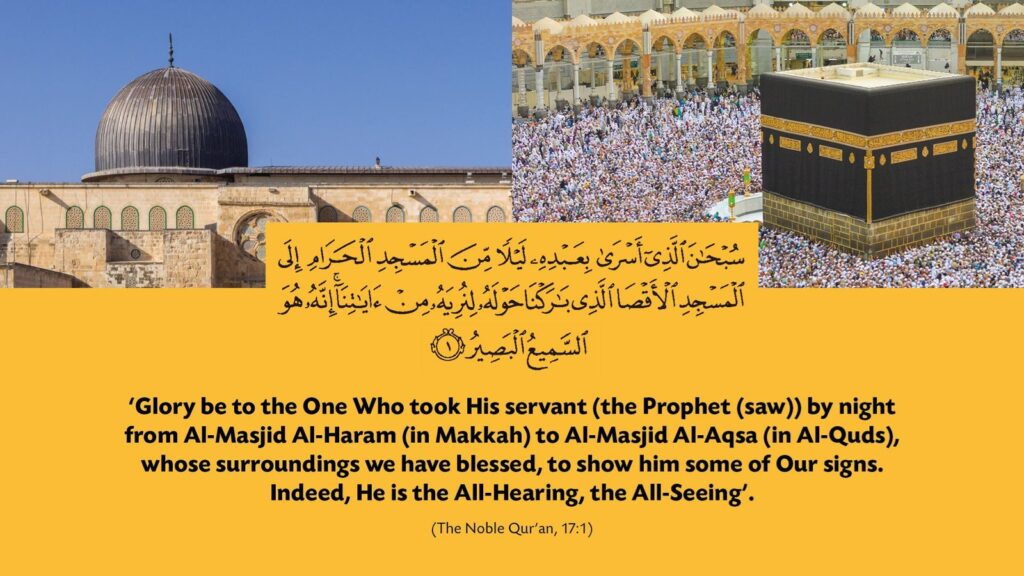
At a time when Islam faced immense persecution, Prophet Muhammad ﷺ experienced Al-Isra and Al-Miraj, the Night Journey and Ascension. One night, as he slept near the Ka’bah, Archangel Jibril awoke him and took him on Buraq, a white-winged creature, from Makkah to Al-Aqsa Mosque in Jerusalem. There, he met Prophets Ibrahim AS, Musa AS, and Isa AS, and together they prayed. Jibril AS then guided him through the Seven Heavens, where he saw countless angels, including Malik, the Keeper of Hell, who revealed its torments. Beyond the seventh heaven, the Prophet entered Allah’s Divine Presence, experiencing a realm beyond human comprehension—pure peace and radiant light. In an instant, he returned to earth. The next morning, when he shared his journey, the Quraysh doubted him, but his precise description of Jerusalem and passing caravans proved his truthfulness.

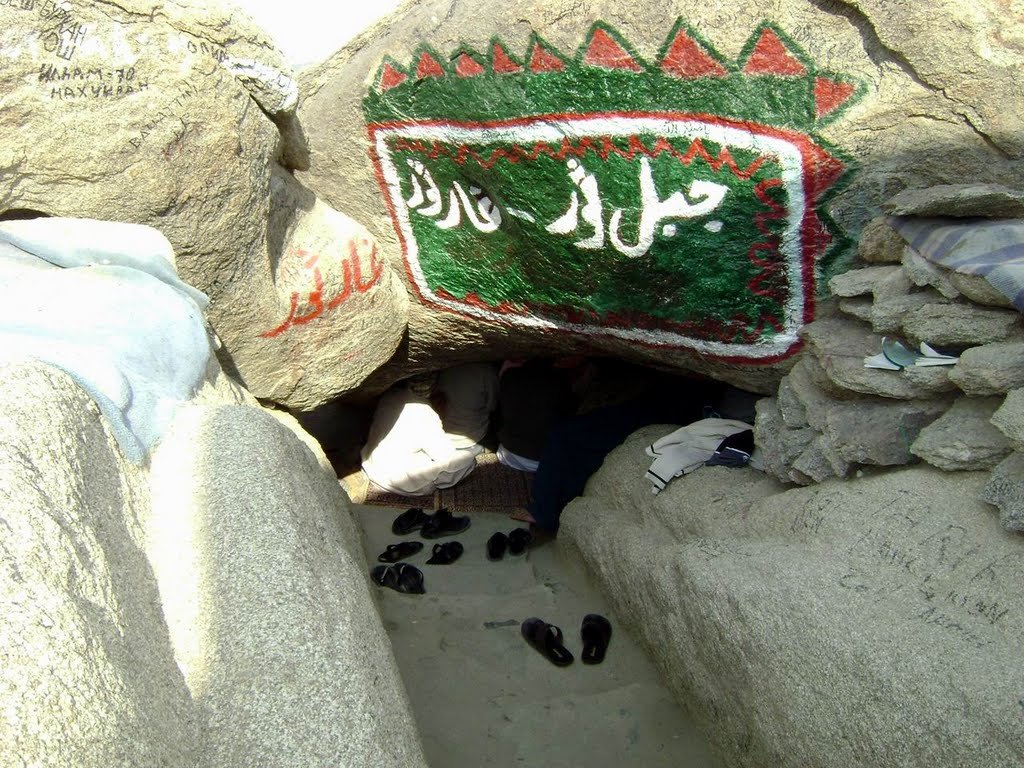
As Islam spread, the Quraysh plotted to kill Prophet Muhammad to end his mission. Allah commanded him to leave for Yathrib (Madinah), where his followers had found refuge. Under the cover of night, the Prophet and Abu Bakr RA departed on camel-back, leaving Ali ibn Abi Talib RA in the Prophet ﷺ’s bed to deceive the Quraysh. Realizing his escape, the Quraysh set a bounty and sent search parties. Anticipating this, the Prophet and Abu Bakr RA traveled south instead of north, hiding in the Cave of Thawr.
A shepherd concealed their tracks with his flock. On the third day, searchers approached the cave. Abu Bakr RA, in fear, whispered, “If they look down, they will see us.” The Prophet reassured him, “We are not two but three—Allah is with us.” The Quraysh stopped at the cave entrance, but one said, “Forget it.” Allah’s protection kept them hidden, and soon, they continued their journey to Madinah.
Hijrah is never for personal gain but for serving Allah. The first great example was the Prophet’s migration from Makkah to Madinah, where Islam flourished. After his Final Sermon at Arafat, many Companions migrated, spreading da’wah across nations, transforming cultures, and even languages.
With the fall of Muslim Spain, Muslims fled oppression, furthering Islam’s reach in North Africa. Similarly, Muslim migrants to the Indian subcontinent helped Islam spread, making it home to nearly half the world’s Muslim population. This post-Prophet migration led to the vast Islamic world, now home to over a billion Muslims worldwide.

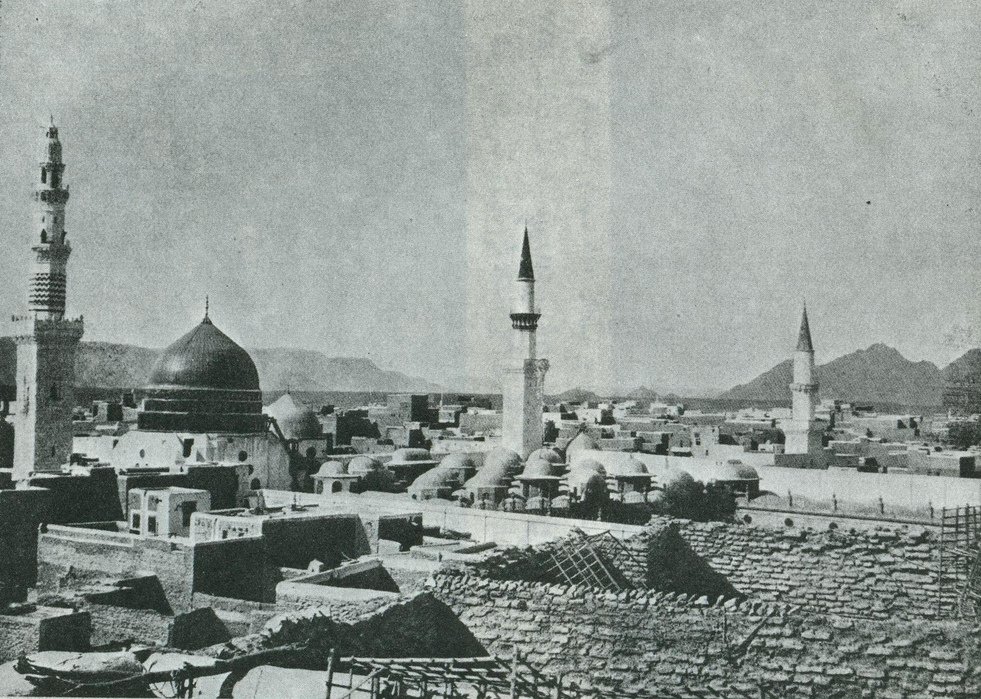
In 622 A.D., twelve years after the revelation of the Quran began, Prophet Muhammad and Abu Bakr arrived in Madinah, greeted by joyful crowds. The people of Madinah, known as the Ansar, welcomed the Muhajirun (migrants from Makkah) as brothers, generously sharing their homes and wealth. From that day, Yathrib became Madinat al-Nabi—The City of the Prophet. Every citizen wished to host him, but the Prophet said, “I shall stay where Allah wills.”
His camel, Qaswa, stopped at the house of Ayub al-Ansari, who became his host. Seeking a place for a mosque, the Prophet’s camel wandered, stopped, turned back, and rested. “This is where Allah wills,” he declared. The land belonged to two orphans who offered it as a gift, but the Prophet insisted on buying it. This land became the site of Masjid an-Nabawi, the Prophet’s Mosque, marking the beginning of a new era for Islam in Madinah.
The Hijrah (migration) of Prophet Muhammad ﷺ from Makkah to Madinah in 622 A.D. marked the first major step in Islam’s global expansion, which is why the Islamic calendar begins from this event. In Madinah, the Prophet established a just social order, guaranteeing freedom of worship for all, including Muslims and non-Muslims.
In his own courtyard, he built Masjid an-Nabawi, which became the center of Islamic teachings. Here, new revelations were memorized and recorded, and the third and fourth pillars of Islam—Zakat (alms-giving) and Sawm (fasting)—were instituted. The Prophet taught that wealth belongs to Allah, and giving Zakat purifies it while preventing greed. Unlike general charity, Zakat is an obligatory duty for the wealthy.
To instill self-discipline and commemorate the Quran’s first revelation, the Prophet introduced fasting in Ramadan, reinforcing devotion and spiritual reflection.

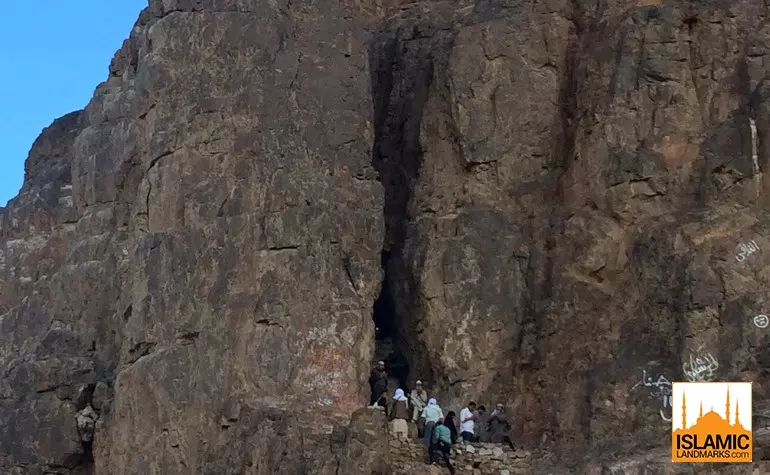
The Prophet’s migration to Madinah only fueled the Quraysh’s anger. In 624 A.D., they marched with 1,000 warriors to attack. The Muslims, though fewer, met them at Badr and, with divine help, secured a miraculous victory. Furious, the Quraysh retaliated in the Battle of Uhud (625 A.D.), bringing 3,000 men. The Muslims, only 700 strong, initially held their ground, but some disobeyed orders, allowing Khalid ibn al-Walid to break their ranks. The Prophet was wounded, losing two teeth. His uncle Hamzah was martyred, and the Muslims lost 70 men.
In 627 A.D., the Quraysh launched another assault—the Battle of the Trench. On Salman al-Farsi’s advice, Muslims dug a protective trench around Madinah. 24,000 Quraysh warriors laid siege for a month but failed to break through. A fierce storm then destroyed their supplies, forcing them to retreat. This decisive failure led to the eventual Treaty of Hudaybiyyah, paving the way for Islam’s peaceful expansion.
In the sixth year of the Hijrah, or 628 A.D., the Prophet SAW, acting on the word of God, set out on a pilgrimage to Makkah along with 1400 Companions. But the Quraysh stopped them at a place called al-Hudaybiyyah, some eleven kilometres from Makkah. Here the Prophet signed a peace treaty with the Quraysh, which was called by the Quran "a clear victory." The Treaty provided for ten years of peace between the Quraysh and the Muslims. There was to be no war or treachery between them.
The Treaty was concluded with the agreement that the Muslims would not make the pilgrimage that year, but that the following year the Prophet Muhammad and his followers would be free to go to Makkah and stay for three days.
The Terms of the Hudaybiyyah Peace Treaty were as follows:
1. that the Muslims would return to Madinah that year without performing the 'Umrah;
2. that the pagans would, however, allow them to do so the next year, provided their stay in Makkah did not exceed three days;
3. that Muslims would not bring any arms with them;
4. that no Muslim residing in Makkah would migrate to Madinah, but if any migrant in Madinah wished to return to Makkah, he would not be prevented;
5. that pagans visiting Madinah would be permitted to return to Makkah but Muslims visiting Makkah would not be allowed to return;
6. that tribes were at liberty to join any of the two contracting parties.

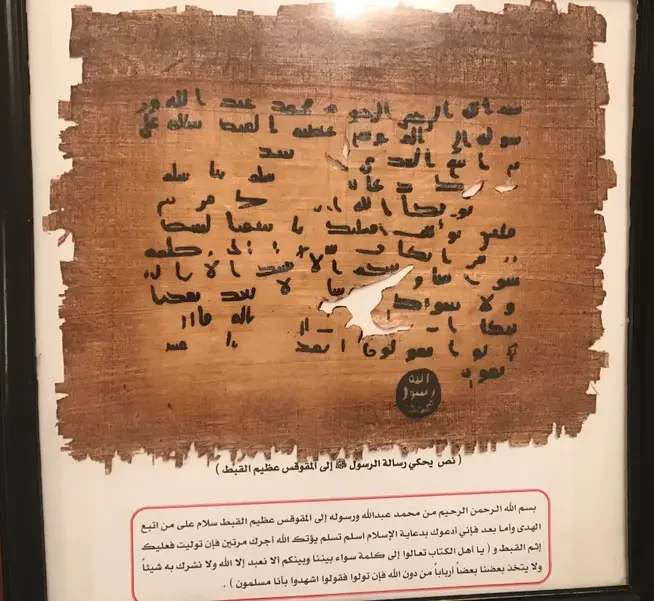
The Treaty of Hudaybiyyah was a pivotal victory, giving Prophet Muhammad ﷺ time to spread Islam across Arabia and beyond. He sent letters to tribal leaders, kings, and emperors, inviting them to Islam. The treaty also allowed Muslims to perform pilgrimage in Makkah. Though they could stay only three days, their simplicity, devotion, and kindness deeply impressed the Makkans, strengthening Islam’s appeal. In just two years, the number of followers grew from 1,500 to 10,000, including several leading Quraysh figures.
Seeing Islam’s rapid expansion, the Quraysh regretted the treaty and secretly violated it, arming Muslim enemies. The Prophet, realizing the need to take Makkah, aimed for a bloodless victory. Without revealing his plans, he gathered 10,000 men and advanced. Near Makkah, he ordered each soldier to light a fire, creating an illusion of a massive army. The Quraysh, terrified and unprepared, saw resistance as hopeless. As one Makkan exclaimed, “Who has the power to confront them?” Defeated without a fight, Makkah surrendered peacefully, marking a historic victory for Islam.
After the Treaty of al-Hudaybiyyah, the Prophet Muhammad ﷺ sent letters to neighbouring kings. These letters, short and simply written, gave the basic message of Islam. Here is the letter which the Prophet wrote to Khusru, the King of Persia:
The Treaty was concluded with the agreement that the Muslims would not make the pilgrimage that year, but that the following year the Prophet Muhammad and his followers would be free to go to Makkah and stay for three days.
In the name of Allah, the Merciful, the Beneficent. From Muhammad, Allah's messenger, to Khusru, the leader of Persia. Peace be to him who follows right guidance, believes in Allah and His messenger, and declares that there is no deity save Allah, the only God, Who has no partners, and that Muhammad is His servant and messenger. I wish to convey to you Allah's call, for I am Allah's messenger to all mankind, sent with the task of warning all those who are alive that doom will befall on those who reject the truth. If you submit to Allah, you will be safe. If you refuse, you shall bear the responsibility for the Magians (i.e. your people).

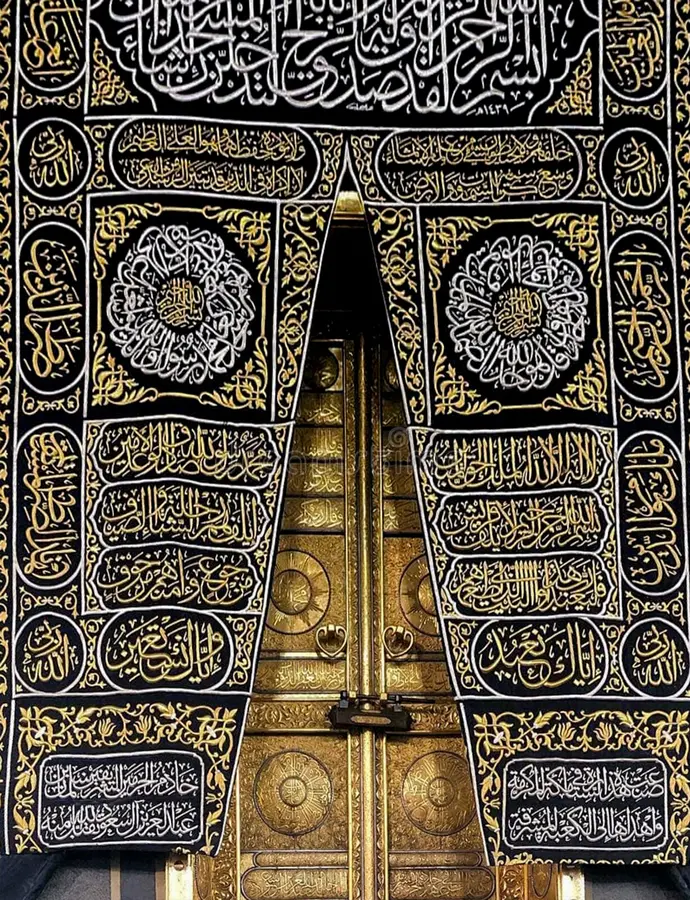
Unlike typical victors who seek revenge, Prophet Muhammad displayed utmost humility upon conquering Makkah. Entering the city with his head bowed low, he acknowledged that the victory belonged to Allah alone. Standing at the Ka’bah’s door, he addressed the Quraysh:
“There is none worthy of worship except Allah. He has fulfilled His promise and humbled the enemies.”
Instead of punishment, he declared:
“I say to you as Yusuf said to his brothers: Let no reproach be upon you this day. Go, you are free.”
Even Uthman ibn Talhah, once a fierce opponent, was forgiven and entrusted with the Ka’bah’s key, a responsibility his family holds to this day. The Prophet then pointed to the idols inside the Ka’bah and recited:
“Truth has come, and falsehood has vanished.”
The idols fell, and the Ka’bah was purified for the worship of Allah, as originally intended by Prophet Ibrahim. Bilal was then ordered to call the Adhan from its rooftop.
As the Quraysh embraced Islam, one by one, Arabian tribes followed. The Prophet sent teachers to guide them, completing the prophetic tradition from Adam to Isa (Jesus). Despite his power, he remained humble, ruling without a crown or throne.

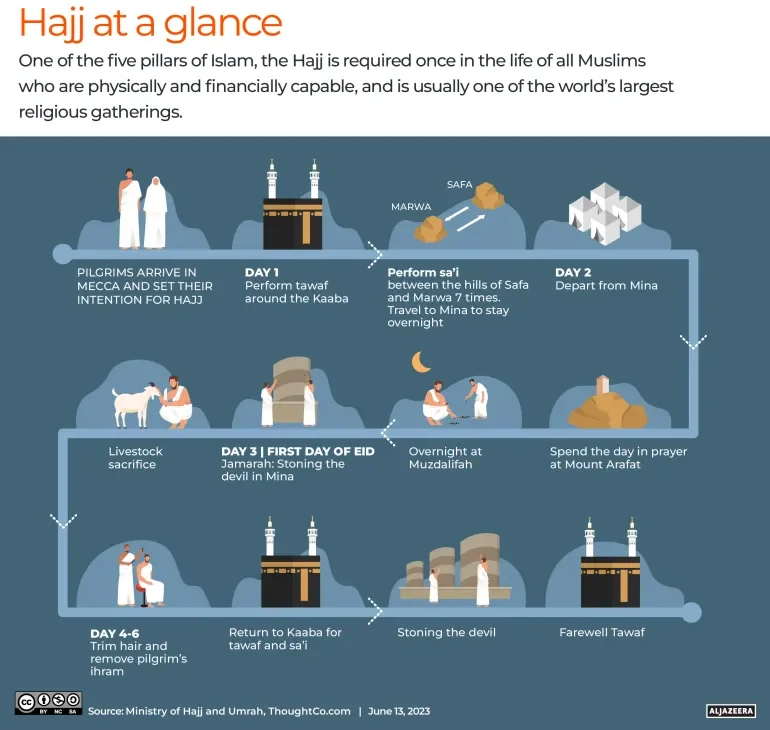
In 632 A.D., during the tenth year of Hijrah, Prophet Muhammad set out for Makkah with 100,000 believers to perform Hajjat al-Wida (The Farewell Hajj). This historic pilgrimage marked the Prophet’s final sermon, guiding Muslims on their faith, equality, and righteousness.
Upon arrival, the pilgrims donned ihram—white, seamless garments symbolizing equality before Allah. They circumambulated the Ka’bah seven times (Tawaf) while chanting the Talbiyah:
“Here I am, O Allah! Here I am! Yours is the kingdom, the praise, and the glory!”
Next, they performed Sa’i, running seven times between Safa and Marwah, honoring Hagar’s desperate search for water when she and Ismail were left in the barren valley. Miraculously, Zamzam water gushed forth, a reminder that Allah provides even in despair. On the eighth day, pilgrims moved to Mina, where Prophet Ibrahim was commanded to sacrifice his son, Ismail. At the last moment, Allah replaced him with a ram, symbolizing submission and faith— a tradition honored during Eid al-Adha.

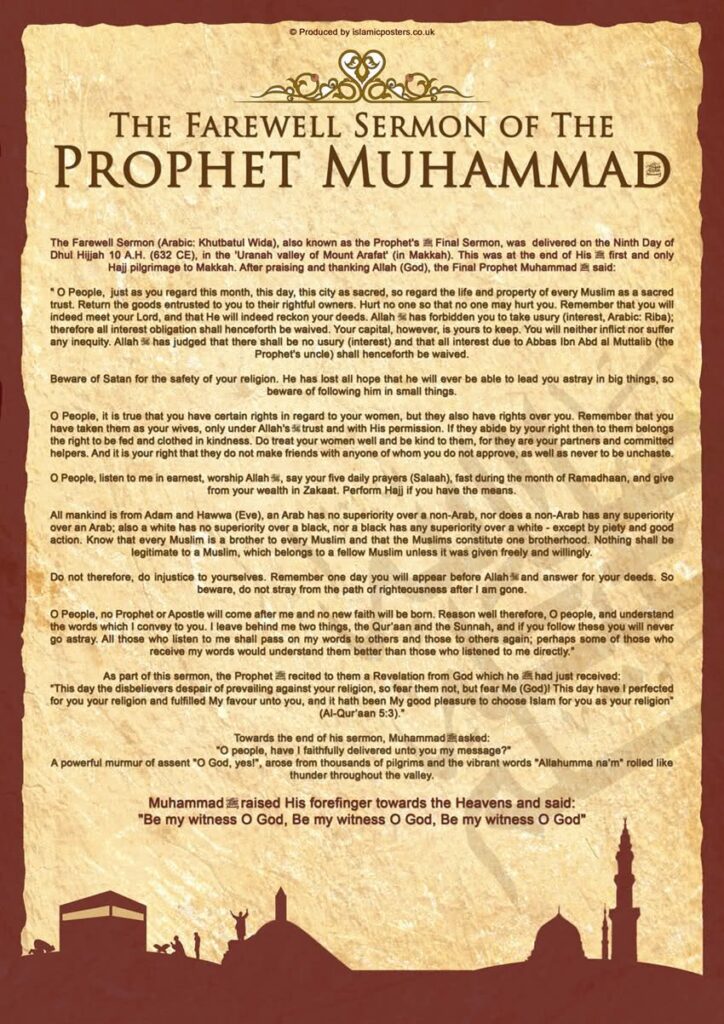
On the ninth day of Hajj, Prophet Muhammad and the pilgrims gathered at the Plain of Arafat, standing bare-headed in the sweltering heat, praying for Allah’s mercy—a ritual known as Wuquf. It was here that the final revelation was sent down:
“Today I have perfected your religion, completed My blessing upon you, and approved Islam as your way of life.”
The Prophet then delivered his Farewell Sermon, urging Muslims to follow the Quran and his Sunnah as their guides. He declared the end of tribal revenge and usury, commanded respect for property and life, and emphasized brotherhood among Muslims:
“Know that every Muslim is a brother to every other Muslim.”
After each point, he asked, “Have I made myself clear?” The crowd responded in unison, affirming his message. The Prophet then looked to the sky and cried,
“O Allah, have I delivered the message?”
The people replied, “We bear witness that you have.” Raising his finger toward the sky, he repeated, “O Allah, be witness!”
He then instructed: “Let those present convey this message to those absent.”
At sunset, the pilgrims moved toward Mina, gathering pebbles for the ritual of stoning Satan—symbolizing Prophet Ibrahim’s resistance to temptation. They pledged once again to serve Allah faithfully. Finally, an animal was sacrificed, and its meat was distributed to the poor.
Three months after returning to Madinah, the Prophet fell ill. On 8 June 632 A.D., at 63 years old, he passed away. Umar ibn al-Khattab RA, in disbelief, threatened anyone who claimed he had died. Seeing the confusion, Hazrat Abu Bakr RA addressed the people:
“O people! Whoever worshipped Muhammad, know that Muhammad has passed away. But whoever worships Allah, know that Allah is Ever-Living and never dies.”
This statement reaffirmed a core Islamic belief—Muslims worship Allah alone, not any human being.


Prophecies about the coming of a great messenger can be found in the religious scriptures of various civilizations, including the Bible, Hindu Vedas, Buddhist texts, and Zoroastrian writings. These prophecies describe a final prophet, sent to guide humanity, whose characteristics closely match those of Prophet Muhammad (peace be upon him). In the Bible, both the Old and New Testaments contain references to a promised prophet who would bring a complete and final divine message. The Torah and Psalms also contain descriptions aligning with the life and mission of Prophet Muhammad.
Similarly, in Hindu scriptures, figures such as Kalki Avatar share striking similarities with the Prophet. Buddhist texts speak of the future Maitreya, a compassionate teacher whose role in guiding people mirrors Muhammad’s mission. In Zoroastrian prophecies, the awaited Saoshyant is described in ways that reflect the characteristics of the Prophet.
These widespread prophecies across different religious traditions suggest a universal expectation of a final messenger, fulfilled by Prophet Muhammad (peace be upon him).
For detailed exhaustive research on this topic, click here to read the book


Founded in 1914, the Lahore Ahmadiyya Anjuman Isha'at Islam promotes a peaceful, tolerant Islam based on the Quran and Prophet Muhammad (SAW).
© 2026 - LA Society - Copyright Reserved by GAAIIL

